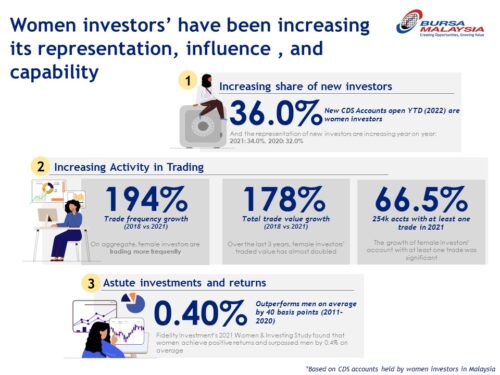WITH Malaysia’s Top 100 public listed companies (PLCs) inching closer to the benchmark 30% figure for women’s boardroom representation (currently at 26.5%), the focus is gradually shifting to propelling gender diversity in the equities market.
Recently, Bursa Malaysia revealed that Malaysian women are increasingly engaged in investing activities, accounting for 36% of new Central Depository System (CDS) accounts opened year-to-date, up from 34% in 2021 and 32% in 2020.
In addition, female investors made up close to 30% of the total traded value in 2021 with a 178.4% increase in total traded value and a 194.1% increase in total traded volume between 2018 and 2021.
Notwithstanding the encouraging findings, Bursa Malaysia Bhd’s CEO Datuk Muhamad Umar Swift said there is still much work to be done to improve financial awareness and participation in investing activities among women.
The bourse would continue to advance the gender equality practices to closing the gender investing gap. This includes providing both men and women equal access to investment opportunities available in the equities market.
Better ROI among female investors
Numerous studies have found that women investors tend to deliver better return on investment (ROI) as compared to men.
For instance, the Fidelity Investments’ 2021 Women and Investing Study found that despite their lacking confidence, women’s investment portfolios tend to outperform their male counterparts.
On average, female investors achieved positive returns and surpassed men by 40 basis points or 0.4%, an analysis of annual performance across 5.2 million accounts from January 2011 to December 2020 shows.
This study is also aligned with Fidelity’s past research showing women may outshine men with a buy-and-hold investing strategy versus frequent trading which tends to stunt investment performance.
Women have also made strides beyond retirement accounts with two-thirds now investing extra savings outside of emergency funds, a 50% increase since 2018, the findings show.
In another survey dated March 2021 by ET Money, women investors were found to have generated better returns than men every year from 2017 to 2020. In fact, during the pandemic in 2020, they recorded 14% returns while men generated only 11%.
Another study by Warwick Business School in 2018 found that among 2,800 investors in its study, not only did the female investors outperform the FTSE 100 over the last three years but they also outshone their male counterparts.
While annual ROI for men were on average a marginal 0.14% above the performance of the FTSE 100, annual returns on the investment portfolios held by women were 1.94% above it. This means returns for women investing outperformed men by 1.8%.
In another classic research entitled “Boys Will Be Boys: Gender, Overconfidence and Common Stock Investment” which was published in 2001, men’s tendency to be more psychologically over-confident regarding investments compared to women has put them at a disadvantage.
The theory suggests that over-confidence in financial acumen leads to more trading and changing of investments which in turn leads to lower returns.
Studies also revealed that female investors focus on longer-term as well as nonmonetary goals by keeping the “bigger picture” in mind.
Instead of simply viewing money as a mean to purchase something, women view money as a representation of something more, ie independence and financial security. Additionally, they are more likely to ask for guidance and direction, thus enabling a more educated and balanced approach to investing.

Inherent investing abilities
In fact, specific behavioural and psychological traits have given women an outperformance edge over men in the realm of investing. Compared to their male counterparts, women are more risk-averse, trade less often, research more diligently, are more disciplined and less over-confident.
The repercussions are also lesser as they tread with caution, investing more in mutual funds rather than stocks; remain invested for the long term without frequent trades and switches; and are disciplined about their asset allocations without any impulsive decisions or knee-jerk reactions.
That women not only have an outcome-based approach to investing but also take a longer-term view doubles their chances of making it to the finish line with the fruits of their investment tightly secured.
Unlike men, women are more focused on the financial goal and not on the mere thrill of investing – they invest in a manner that helps them achieve goals in the given time.
The bottom line is that financial empowerment is one of the most important reasons why women should start investing.
Financial literacy and awareness not only help secure their financial futures but also that of their family without having to feel lost due to their ignorance or be forced to depend on others for financial guidance when disaster strikes.
Devanesan Evanson is the CEO of Minority Shareholders Watch Group (MSWG).
The views expressed are solely of the author and do not necessarily reflect those of Focus Malaysia.










